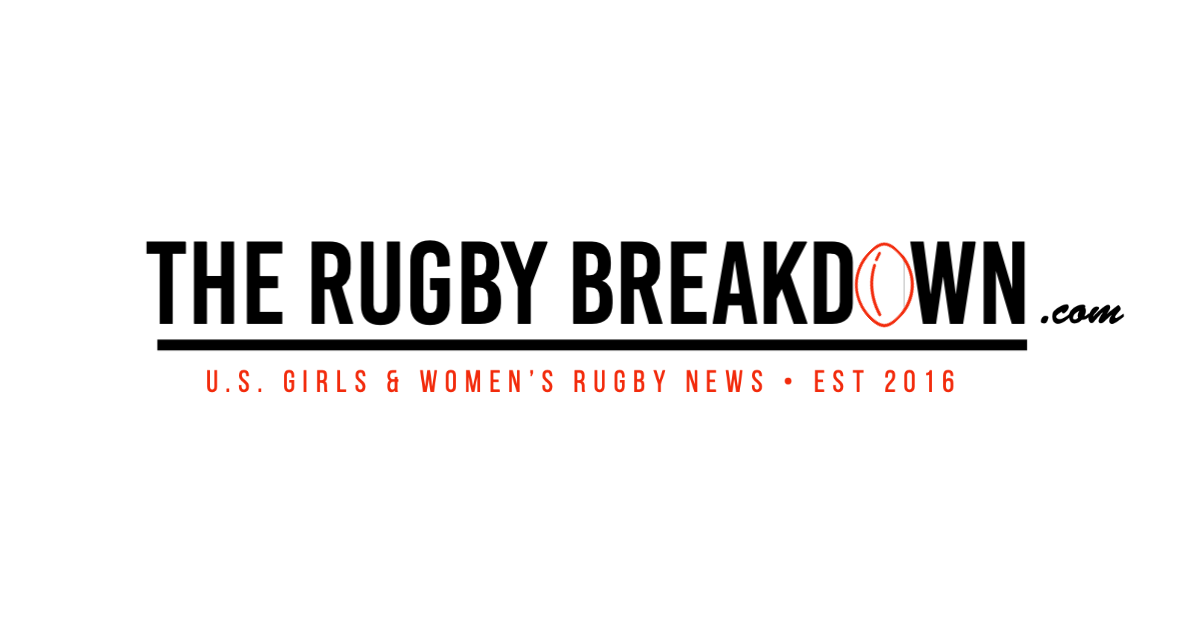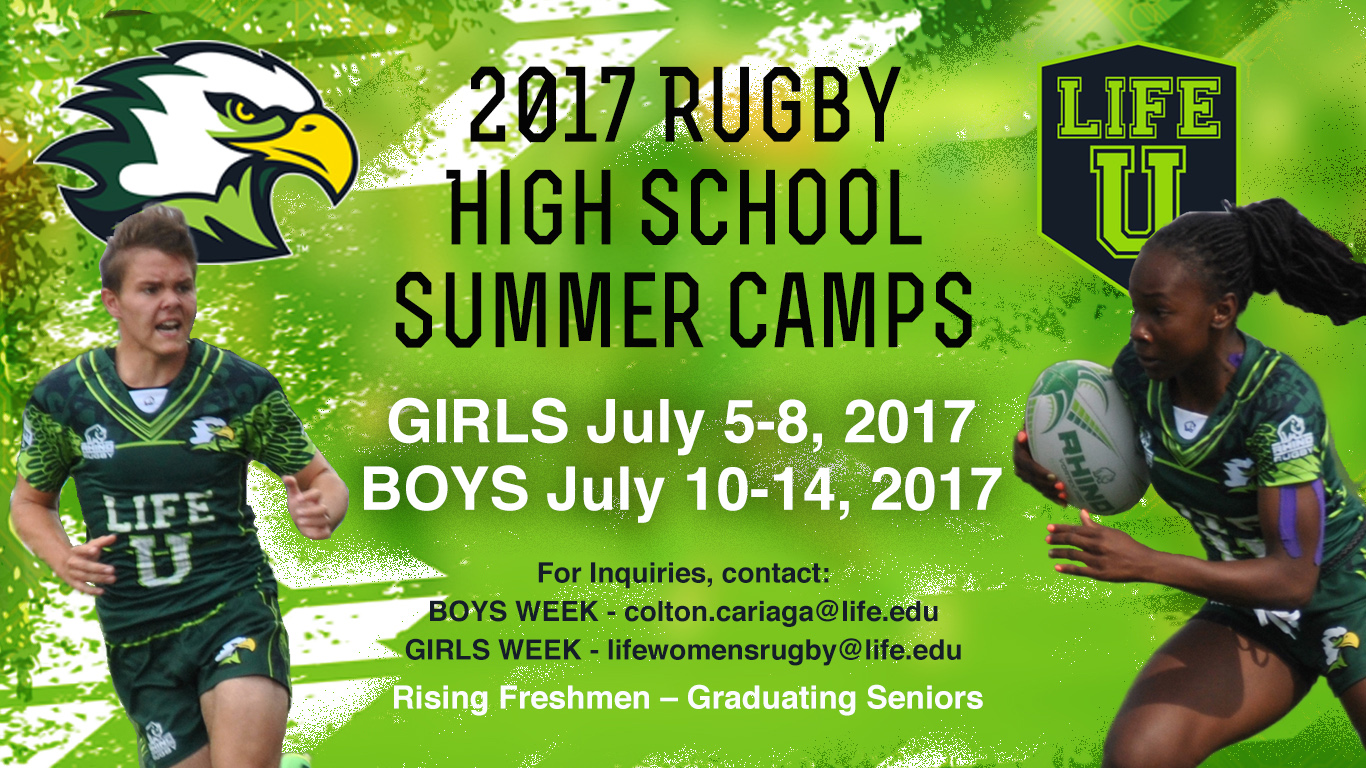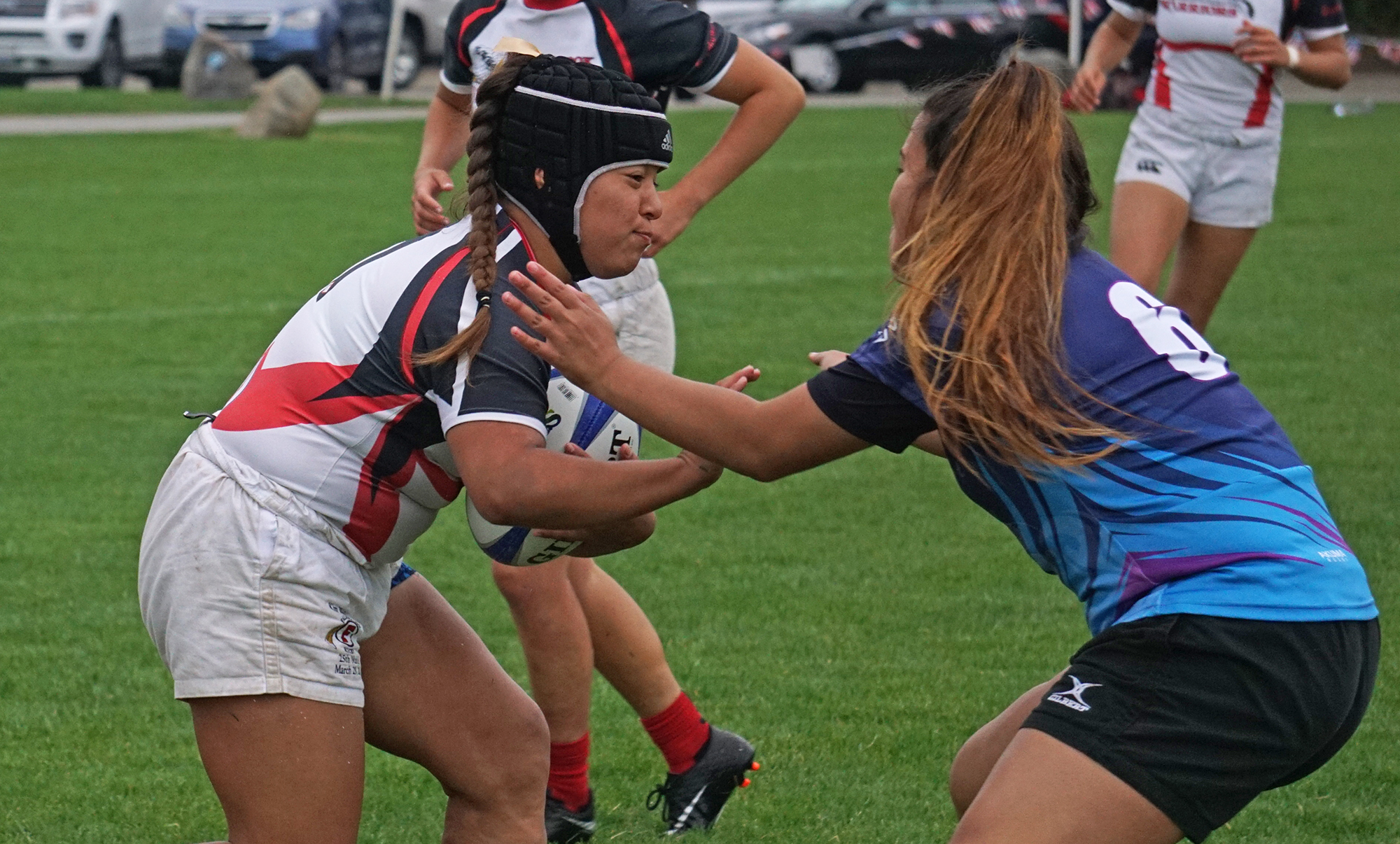
Photos: Jackie Finlan
During the Girls’ High School National Championships, the club semifinal between Fallbrook and Sacramento was called before the half, and Fallbrook was awarded the berth to the final against United. Head referee Gray O’Dwyer and Sacramento head coach David Tausinga offered their perspectives on what led to a nationals first.
Related: Video: Fallbrook vs. Sacramento • HS Nationals Results & Brackets • United Wins HS Club Championship
Sacramento entered the tournament as the reigning champion and opened up its weekend in Elkhart, Ind., against Midwest club champion Hopkins from Minnesota. Watch the match, and one sees big, strong, young women playing a physical game. Hopkins was not without. The Johnsons-coached team had players going forward and breaking the line and kicking to space. They also had players who were learning how to get hit with incredible force. There is technique in bracing and protecting oneself and the ball in contact.
“I talked to the [Hopkins] coach before the game, and they’re just trying to grow the game in Minnesota,” Tausinga recounted. “I understand that, but we’re at nationals. We came here with a certain amount of players, and we were playing to secure a position in the final. It’s great that they want to grow the game, but we’re on the big stage; we’re here to perform and get looked at by colleges. [The colleges] already do that – they talk to us – but that’s what we’re there for.”
Sacramento scored two converted tries per half for the 28-0 win. For Hopkins, it’s what they do with this experience. Recall 2010 when Fallbrook played Sacramento for the first time. The Warriors got beat, soundly, and then spent the next year learning to tackle size and protect the ball. They went on to win five-straight national championships.
“We have punishing runners. Our girls hit really hard. … But it felt like someone went to the committee or the refs and said our girls were playing dirty,” said Tausinga as a lead-up to the semifinal. “Right off the bat, I thought: We’re in for a long day.”
The first thing that referee O’Dwyer recalled was the amount of jewelry both teams were wearing. Three times – during the pre-game team chats, captains’ coin toss, and when inspecting Sacramento’s leggings – O’Dwyer instructed players to remove jewelry for safety reasons. The fourth reminder would result in a yellow card.
But there was some more lead-up to that first card. Around 5:12 there’s a late hit and the ref warns the player as play continues. Shortly afterward, the first of many stoppages occurs.
“The first call, Oshaya [Jefferson] was coming up to drive a girl off the ball [5:23]. She blows the whistle,” Tausinga said. “Normally, with a penalty, you put your hand up and keep playing. She stops the game instead, calls the captain over and starts explaining. I don’t know what’s being said.”
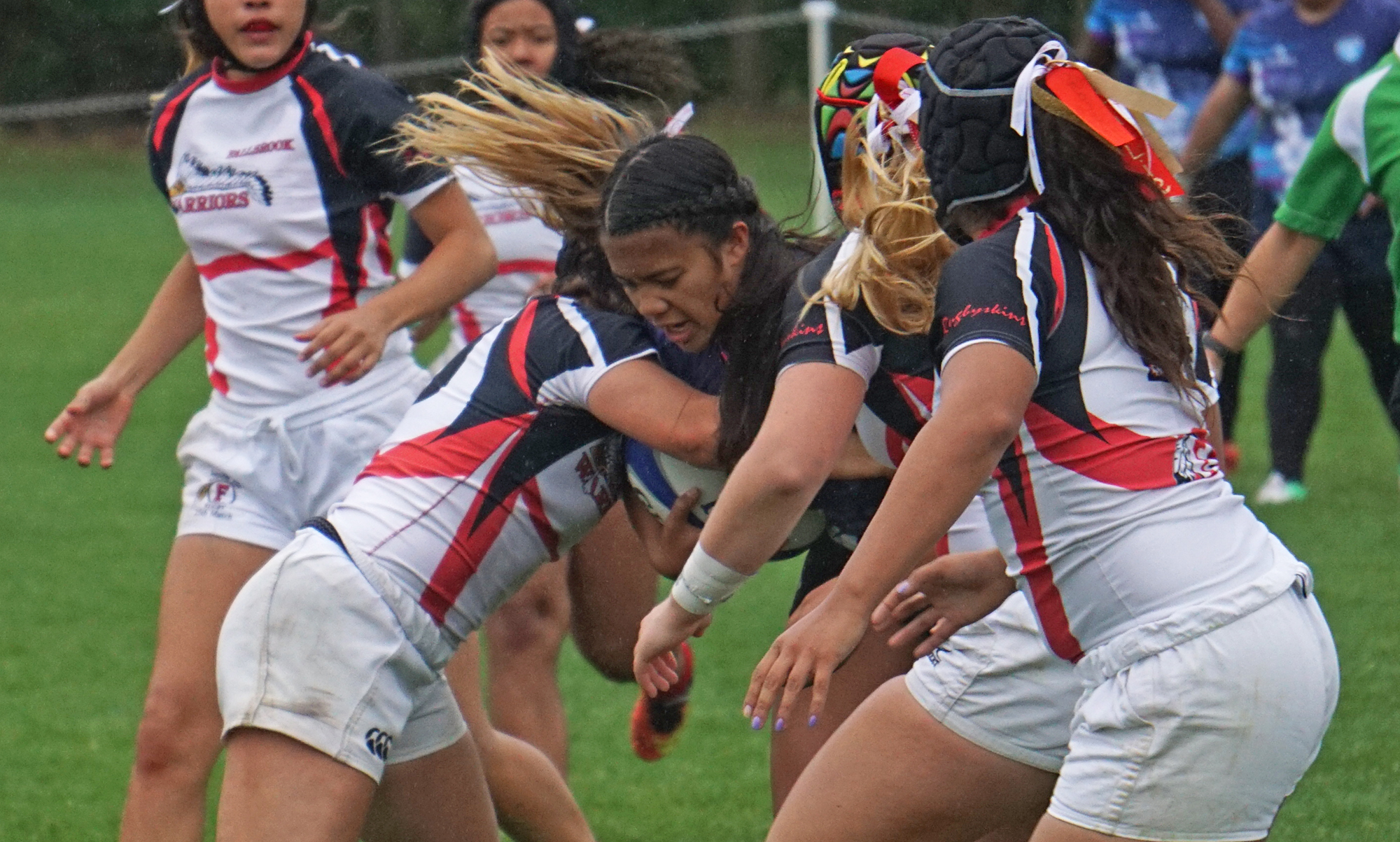
“There was an issue with an egregious high tackle by blue number four,” O’Dwyer said. “I stopped play and spoke to her and said, ‘Look, this is early in the game. I’m asking you to address this. Please make sure this doesn’t happen again.’
“Within the next couple of minutes, there was a tackle – it was a perfectly legal tackle – but the blue player grabbed the red player by her braid [6:50] and took her down by her hair,” the ref continued. “Again, not illegal. … I stopped play and said, ‘Look, we’re here to play with sportsmanship, and in the spirit of the game I’m asking you to refrain from doing something like that again.’”
When the teams reconvened for a scrum, that’s when O’Dwyer noticed a Sacramento player wearing a silver chain.
“I have given you three opportunities to take off your jewelry and at this point it’s cynical and I have to send you off,” O’Dwyer said. “So I issued her a yellow card for the jewelry. The team seemed pretty unhappy about that.”
As play continued, O’Dwyer stated that there were numerous instances of borderline unsportsmanlike conduct, but reiterated that nothing was illegal. There were a lot of stoppages and lots of conversations with Sacramento captain Maryjane Pasioles, who was tasked with managing her teammates and later managing an entire sideline. One can see it takes a toll on the scrumhalf, a graduating senior who has played international rugby with USA representative teams.
Tune in at 9:07 when Sacramento is pinged for an offsides penalty. Pasioles throws her hands up, looks to the sideline for help, then puts her head down to retreat 10 meters.
“It’s something we have to learn. At practice, we’ll blow the whistle constantly until it frustrates the players, and they have to try their best not to talk back,” Tausinga said. “Look at how many times our captain got called. She just had to turn her head to the side and swallow that pride and not talk back to the ref.”
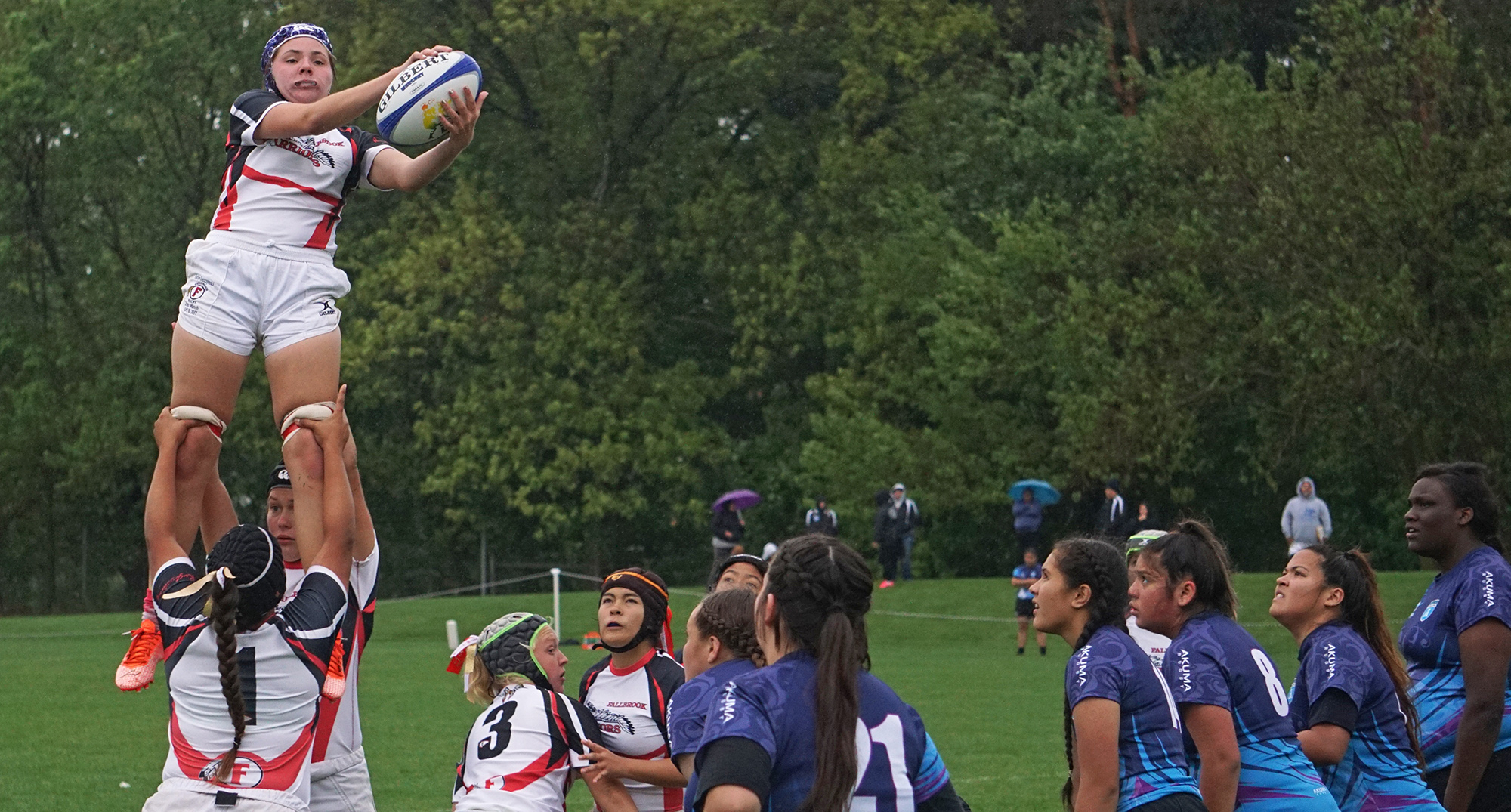
Shortly afterward, Lilly Durbin went on a stepping run and a penalty helped Fallbrook to keep moving forward. At 10:47 the ball moved to Naomi Colin, who had two players in support on the weak side of the ruck and five meters to Sacramento’s try line – the whistle blew. It was a penalty in favor of Fallbrook.
“It was an issue because [Sacramento’s] entire back line was not retreating and I called offsides twice,” Dwyer said. “Their entire back line continued to loiter offsides and I stopped play.”
A conversation with Pasioles followed, and this is when she had to start speaking to the sideline. Sacramento was able to push Fallbrook out of scoring contention, and play eventually returned to Fallbrook’s 22 meter. The whistle blew.
“Our girls were so used to getting penalized, they ran back 10 meters,” Tausinga half-chuckled. “It was a penalty in our favor, but the game stopped and we were getting talked to.”
O’Dwyer cited an attitudinal flare-up during her conversation with Pasioles at 23:30, but the opportunity turned into three points off Salote Tausinga’s boot.
And then it hit the fan. Watch the sequence of events beginning at 25:28. In advance of the red card, O’Dwyer indicated that late, high, no-wrap tackles had been a topic of conversation.
“I had spoken to the number one on at least two occasions,” O’Dwyer said of No. 8 Eti Haungatau but indicated she addressed the forwards as a whole during a scrum.
“I was coming across the field … as I turned to follow the ball I saw a player hit another player late and high with no attempt to wrap,” O’Dwyer retold the series in her own words. “But again, it wasn’t severe, it didn’t knock her down. But again, another incident of something I had spoken to the team about multiple times. And then immediately after was when the number one hit … the red player, knocked her down, absolutely demolished her and late, high, no attempt to wrap – her arms were in the upright position.
“So because of the multiple behavior issues, the lack of discipline, the fact that it happened twice in a single play, I need to make a statement with this,” the ref continued. “I felt the red card was warranted not only because I needed a statement to clean up the play but because to me it was a two-yellow card offense – it was late, it was high, it was cynical. So two yellows escalated for a red to me. … This is the last straw; I have to do something here.”
Haungatau is like a Durbin, Kat Stowers, Emily Henrich – her presence on the field fundamentally changes the game. That red card meant the All-American’s time at nationals was over.
“First of all, as a coach, I’m concerned about my players and what’s happening on the field,” said Tausinga, who was trying to get more information about the red card and the warnings. “But yeah, I can understand why the fans would blow up after something like that.”
“The sidelines were screaming abuse. And the players were starting to mutter,” O’Dwyer said. “I heard comments from the players involving obscenities. I heard comments from the players saying the ref was not listening to them and the ref was being unfair. It seemed to me that I was quickly losing control of the players and again, I tried to ask the captain to intervene.”
Fallbrook slotted a penalty goal after the red card (3-3) and the teams reset at the 50. Near the 28:00 video mark, O’Dwyer asked Pasioles to send the spectators to the parking lot.
“The crowd is egging on the players. The players are using the comments from their parents and their supporters. It’s coming into the game and if I’m going to make sure that we finish this game in a safe way, that needs to stop. So I asked the captain to go to the sideline and tell them to go to the parking lot. … They lost it,” O’Dwyer recounted the spectator reaction, which included an audible obscenity from a female fan.
“I would not normally make an issue out of it from the sidelines. It’s a matter of discipline but the sideline does not normally affect what goes on on the field,” she continued. “As soon as she said that [obscenity], I heard, ‘Yeah,’ from behind me from one of the players. And at that point I was like: The players are clearly not willing to play with sportsmanship. The players are agreeing with their parents and their supporters that the game is out of control. I feel it’s unsafe. I’m distinctly worried that there is going to be a severe injury because I felt the blue team was not going to play safely or under control at all. And so I said, ‘The match is over. I’m done.’ Again, I did not feel safe continuing the match.”
“The girls broke down. Once we lost one of our best players – and if you know Eti like I know her, she’s a soft-hearted girl – we lost the engine in the car. But give us a chance to fight afterward,” Tausinga said. “It was 3-3 at that point – who knows what would have happened? I was fully focused on the players, but the ref should have talked to us, the coaches. That back-talk, that happened as they were being ejected. Refs do take abuse, but there’s a better way to handle it. Don’t take it out on the girls.”
“I’ve never abandoned a match in my life – ever,” O’Dwyer said. “And I’ve had some rough matches. I’ve had some days where I wanted to quit rugby but I’ve never, ever had a sideline behave that way.”
“To spend all that money and have to walk away,” Tausinga lamented the $30,000 raised for nationals. “Since we teamed up with SacPAL, the police officers went over there and fought for us that day. They tried to contest the red card for us, and they got the third-place game for us.”
Sacramento went on to play Land Park to a 20-12 win for third place. Haungatau’s red card stood, but Tausinga indicated that there was no formal appeal process.
“I don’t take anything away from Fallbrook. I respect their players and coaches. They have a good program. And we have daughters who play on the same team,” the coach said. “On the sideline the next day and all that other stuff, I could hear the parents going at it. It’s not about them; it’s about the kids.”
Tausinga asserted that his opinion of nationals has soured, and when O’Dwyer spoke to the players on day two, lamenting the way things shook out in the semifinals, the coach said, “That’s like taking a limb and then apologizing for it while I’m still bleeding. … It is what it is.”
There are many issues that need review – some that have video support, others that come down to perception but need documenting nonetheless, and reflection on how this all impacts girls’ high school rugby, which deserves all the support it can get.
Sacramento #2017NationalInvitationalChampionship

